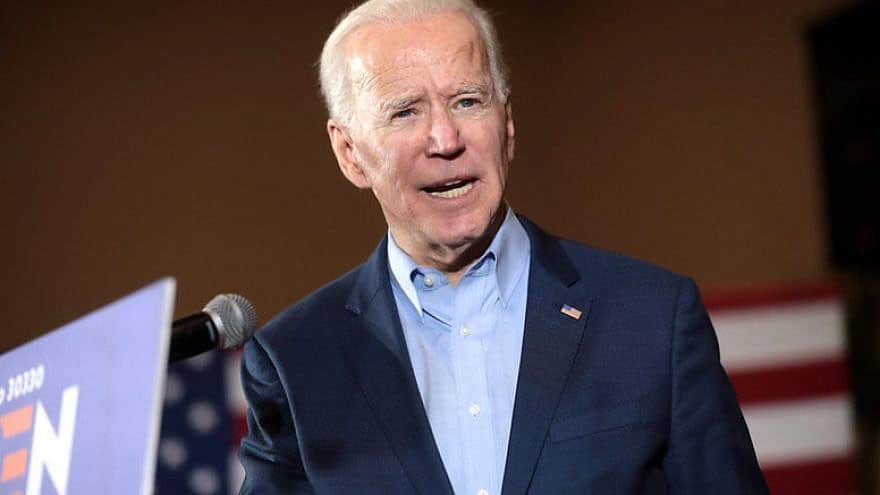 U.S. President Biden on the campaign trail in Henderson, Nev., on Feb. 14, 2020. Credit: Flickr/Gage Skidmore.
U.S. President Biden on the campaign trail in Henderson, Nev., on Feb. 14, 2020. Credit: Flickr/Gage Skidmore. (JNS) U.S. President Joe Biden told CBS’s “Face the Nation” on Sunday that he would not lift sanctions on Iran as a way of persuading it to return to the negotiating table, and that it would have to first cease enriching uranium.
A Biden administration official later clarified that the president meant that Iran must stop enriching uranium beyond the limits spelled out in the 2015 nuclear deal, the Joint Comprehensive Plan of Action (JCPOA), reported Reuters.
NEW: In an interview with @CBSEveningNews, @POTUS tells @NorahODonnell the US will not lift sanctions against Iran unless the country stops enriching uranium:
"Will the U.S. lift sanctions first in order to get Iran back to the negotiating table?”
“No,” Biden says pic.twitter.com/IXegtuw2y1
— Face The Nation (@FaceTheNation) February 7, 2021
According to the terms of the JCPOA, Iran may only enrich uranium at its Natanz facility, and only with first-generation IR-1 centrifuges.
“They have to stop enriching beyond the limits of the JCPOA,” Reutersreported the official as saying. “There is nothing changed in the U.S. position. The United States wants Iran to come back into [compliance with] its JCPOA commitments, and if it does, the United States will do the same.”
Biden’s comment about sanctions came a day after Iranian Foreign Minister Mohammad Javad Zarif told the Iranian newspaper Hamshahri that “time is running out for the Americans” to re-enter the JCPOA—from which former U.S. President Donald Trump withdrew in 2018—and lift sanctions on the regime in Tehran.
Referring to legislation, passed in November by the Iranian parliament, to “force” the United States and the European Union to revoke sanctions or face increased nuclear-related activity from Tehran, Zarif stated: “The more America procrastinates, the more it will … appear that Mr. Biden’s administration doesn’t want to rid itself of Trump’s failed legacy.”
The legislation requires that Iran produce 120 kilograms (265 pounds) of 20 percent-enriched uranium a year; the activation of 1,000 IR-2M centrifuges in the underground section of the Natanz nuclear facility; the installation and activation by April 2021 of 1,000 advanced IR-6 centrifuges at the Fordo site; and the immediate reactivation of the IR-40 Arak heavy-water reactor facility.
“We don’t need to return to the negotiating table. It’s America that has to find the ticket to come to the table,” said Zarif.
On Tuesday, Tehran’s envoy to the International Atomic Energy Agency Kazem Gharibabadi tweeted that Iran is currently operating two cascades of 348 IR-2M centrifuges in Natanz and that installation of two cascades of IR-6 centrifuges had begun at Fordow.
The operation of the cascades is in violation of the JCPOA.























 More news and opinions than at a Shabbat dinner, right in your inbox.
More news and opinions than at a Shabbat dinner, right in your inbox.